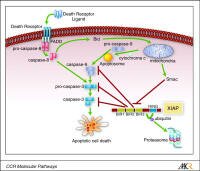 Apoptosis and necrosis are two major ways by which cells die. Apoptosis is the ordered disassembly of the cell from within. It's a natural mechanism by which cells "commit suicide" when they have outlived their purpose, become defective, or have aged.
Apoptosis and necrosis are two major ways by which cells die. Apoptosis is the ordered disassembly of the cell from within. It's a natural mechanism by which cells "commit suicide" when they have outlived their purpose, become defective, or have aged.
... The old or defective cells "take one for the team." That some cells die and other live on to replicate helps to achieve a balance in the body. What happens in a cancer cell is that some parts of the cell machinery that carry out, signal for, or authorize apoptosis no longer function ... because of damage to genes that produce proteins that regulate or carry out these functions.
So the search has been on to identify how cancer cells resist cell death and then to design a drug that inhibits this mechanism. This class of drugs is sometimes called inhibitors of the inhibitors of apoptosis - agents that allows the "red KILL button" to be pressed.
Chances are you've seen a movie with apoptosis as part of the plot ... in almost any James Bond film. A fortress containing classified information is rigged for destruction by the owners if the security of the building is compromised. The process requiring a series of commands, which are relayed from one authorized person to another. This to prevent a programmed self-destruction by a careless mistake or a rouge individual. The fail-safe system is carried out from within by specialists, and regulated by others.
... The trigger is not pulled until all the criteria is met: the security threat is real and it can't be corrected; the command has been given by authorized individuals and verified by others, and the actions carried out by specialized personnel. The security breach starts a chain of events (a cascade); each player communicating to the other until the big red button is pushed and the building destroyed; the sensitive information within it evaporating.
Similarly, our cells are rigged for self destruction. Many chemotherapy treatments are designed to exploit apoptosis ... by causing sufficient damage to the cells that force the issue, magnifying the urgency to self-destruct. Waking up the components in the cell that authorize apoptosis, such as the P53 gene.
Imagine that a key protein within the cell is overactive and is giving a STOP order. Then imagine a small molecule drug that fits the shape of this protein, stopping the STOP order.
See for a video explanation of apoptosis by Cancerquest.org: 